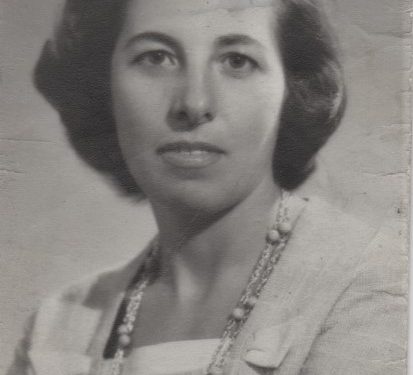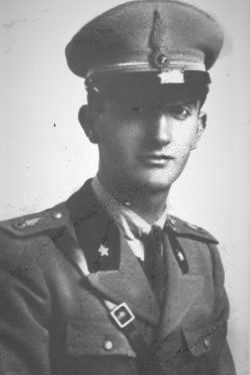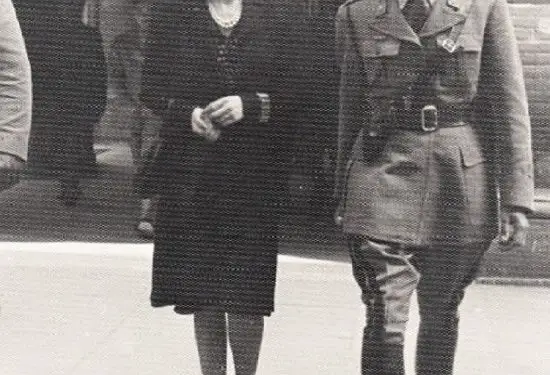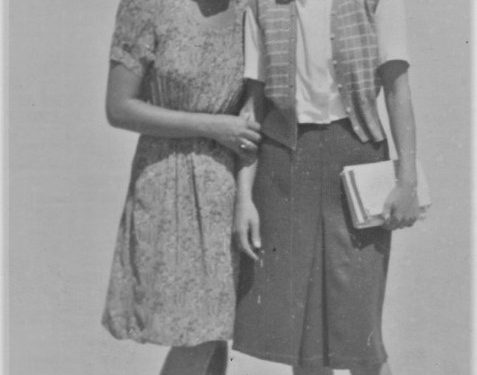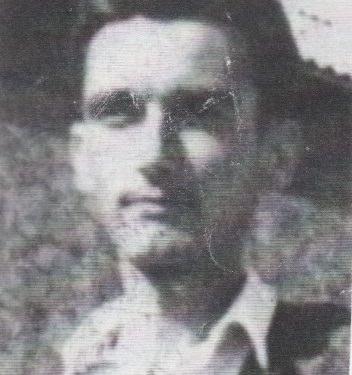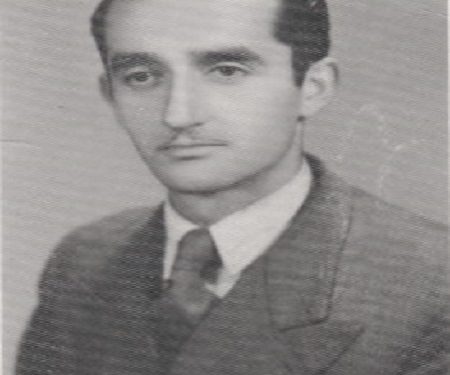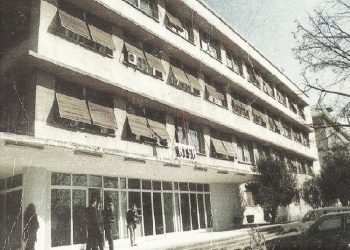From Lek Pervizi
Part twelve
THE ODYSSEY OF INNOCENCE
To my brother Valentin, who for 47 years straight,
endured the ideological storms of communism,
and what’s more, separated from his wife,
a true Odysseus in the middle of the twentieth century.
Memorie.al/As you enter Skuraj and cross the Urdhazës stream, the mountainous climb begins, across the hill called Lekbibaj. You pass three mills, known as Gjin Pjetri’s mills, which stand one after the other. You also pass the two-story tower of Ndrec Pjetri, Gjin’s younger brother, and then you come across a rocky ridge on which stands a complex of three stone buildings, the historic towers known as the towers of Gjin Pjetër Pervizi of Skuraj, the leader of the Kurbin uprising. These buildings dominate the entire valley formed by the joining of the Mat and Fan rivers (a branch of the Mat), all the way to Milot. It is almost a fortress that guards and protects the land from the expeditions of foreign invading armies that could penetrate that gorge, until they were met by the wall of the Skuraj Mountains, where the aforementioned towers stood.
Continued from the previous issue
Gori’s Repatriation
A sad day was approaching for Valentin. He was called to the office, where his wife had arrived with a special meeting permit to say goodbye to him. The meeting, as one can imagine, was very touching, so much so that Valentin thought even the director was moved, because after a while, he got up and started pacing up and down the room, leaving the couple alone to talk freely.
Valentin tried to calm his wife, giving her courage and heart, and taking advantage of the moment when the director was walking to the back of the room, before he turned back, he told Gori that at the earliest opportunity, he would try to escape from Albania, so there was a hope of salvation for them. Or after the first wave of these drastic measures, the situation would calm down and the possibility of their reunion would be created again.
These words seemed to calm his wife, so much so that she composed herself. Of course, he didn’t just say that to calm her down, but he was convinced that later the opportunity might arise for him to undertake such an action at the first favorable moment. The situation was also unpredictable. Maybe the Allies would intervene for an improvement of the situation.
It must be emphasized that, unfortunately, throughout the 45-year period of the communist regime, Valentin did not have the slightest possibility of escape, because he was constantly guarded. As is known, he spent his entire life in internment camps, where he had to report for roll call two or three times a day, and no one dared to be absent, because the entire State Security would be alarmed.
The director allowed the meeting to be extended until the two of them themselves indicated that the time had come to part, and they did not want to take advantage of his kindness. So his wife greeted the director, shaking his hand as a sign of gratitude. But Valentin was surprised when the director, as he was seeing them off at the door, squeezed his hand tightly, saying: “Don’t be sad, because you never know, you might be released and thus, you might be reunited with her again!”
Valentin thanked him, and he left them alone again as they crossed the salon and went down the stairs. When they reached the bottom of the stairs, they hugged before parting, unable to say a word, so much had emotion taken over them. Valentin held himself back from shedding tears, even though on the other side of the bars, his prison friends had gathered, who wanted to be near them in those painful, not to say dramatic, moments.
Gori could not hold herself back and burst into heartbreaking sobs, and that’s how she left the prison, completely distraught and stunned. It was the separation of a new “Penelope,” which marked the beginning of Valentin’s unimaginable “Odyssey,” his fight for life or death.
The Trojan War had lasted 10 years, and it took Ulysses another 10 years to go through hardships and dangers until he returned to Ithaca. How long would Valentin’s “Odyssey” last?! Well, the first ten years were pardoned. But then, would there be a solution for his reunion with his wife, from a softening of the situation? Or would other troubles await him, in the example of the sea storms and collisions on the hostile shores of the Odyssey, for another ten years, and a normal human mind could not imagine that half a century would pass.
All those who had gathered there, inside and outside the prison, her friends and some family friends, were very shocked by that separation, forced by such absurd circumstances, where a regime with communist features and criminal habits treated people without regard for their simplest feelings, desires, and needs, where all human rights were openly trampled in the most barbaric way.
This was the regime that had been established over the Albanians, who initially fell into the trap of communist propaganda, which had promised them that they would eat with golden spoons, and which, by all accounts, would force them to eat with wooden spoons, not to mention stone ones!
After the first days passed with a certain sadness, which his friends tried to alleviate with their conversations, the Head of the Internal Branch of the city, Zoj Themeli, known as a heartless man, came there.
He went from room to room, and when he saw a familiar face, he would stop to talk to them. He came to Valentin’s room, where everyone stood up and lined up for him to pass by. He would ask each one for their first and last name and ask them a short question. When he stood in front of Valentin and found out who he was, he asked:
-“Well, have you received any news from your wife?” And after a while he asked if he had any requests. Valentin was a boy who was not shy at all with anyone, and moreover, he was upset by his emotional state after his wife’s departure. So he addressed the Head of the Branch, whom people were terrified of just by looking at him, so notorious was his reputation as a criminal and scoundrel. He asked him if it was fair to keep him in prison, knowing well that he was completely innocent and had done nothing against the regime, having lived abroad for many years and almost never having come to Albania, where no one knew him, nor did he know anyone.
Zoj Themeli answered calmly:
-“You must know that if we released you, the people would come to us to ask for an accounting for that matter. They would come protesting and asking us why we released the son of Prenk Pervizi, a mortal enemy of the regime, etc.” After saying these words, he moved on. Then he went out into the corridor, and before going down the stairs, he said:
-“Your family is interned in Berat, right?!”
-“Yes,” Valentin replied. As he went down two stairs, he added:
-“Maybe we will intern you in Berat too.”
The next day he received a telegram from his wife, where she told him that she had arrived in Bologna, where she was with her family.
Thus, the days and months passed, and two years were completed from the day of his arrest. One morning, they called him downstairs, along with a well-known Shkodra photographer named Ded Jakova. This man, along with Professor Guljelm Deda and the teacher Zef Agimi, ever since his wife had left, had invited him to share the food their families brought them.
We have talked about Guljelm and Zef when they burst into laughter during their trial session, precisely when their indictment was being read. They were saved with five years in prison. Valentin and Deda were lying down and thoughtful when they came and took them and brought them handcuffed and guarded to the Sigurimi offices. They handed them over to an officer who took them to a salon, where they had to wait until they were called. They waited there for some time, still tied up. From the salon, one went to the second floor via a carpeted staircase, while downstairs on the first floor, one went down a concrete staircase.
Officers or simple soldiers would pass by, looking at them as if they were wild animals. After an hour, from a side door, an officer came out and came straight towards them, with a key in his hand, who freed them and went downstairs with Deda. He told Valentin to wait there. Poor Deda, ever since they had handcuffed him in prison, had been so afraid that he hadn’t exchanged a word with Valentin during the journey. When he went downstairs, he had turned pale. Who knows what was waiting for him on the first floor, and Deda knew well, because it was not the first time they had brought him there.
Maybe they wanted to know other things from him, and who knows at what price?! It wasn’t long before another door opened, where an officer appeared who motioned for Valentin to follow him into the office. After they sat down face to face, with the table in between, the officer took a sheet of paper and a fountain pen and began:
-“When did you come from Italy?”
-“In October 1944.”
-“When were you arrested?”
-“The first day of the Shkodra curfew.”
-“From the day of your arrival until the day of your arrest, did you meet with relatives or acquaintances?”
-“With no one.”
-“Well, it won’t be long before you also appear before the court, where you will be sentenced, but lightly.”
All this was neither an interrogation nor a trial, but simply a formality for which Valentin had been called, precisely to justify his long detention in prison, knowing full well that he was completely innocent. It’s not that the others who were shot and sentenced very heavily were guilty. But for the unique case of a man who had not lived in Albania and had arrived at the time when power had passed into the hands of the communists.
He had come to serve his homeland as an officer from a military academy. But the communist system did not take into account the abilities and good qualities of people; in fact, for such qualities, you would end up in the worst possible way, and you could even lose your life. For curiosity’s sake, we should add that there were other academics that came from Italy, to whom nothing had happened. In fact, there were cases where they were assigned to work, to teach military art, in courses that had been created, but Valentin was viewed and treated as the son of Prenk Pervizi, which for him was a fact of condemnation that fell under the criteria and laws of the communist regime, which were included in the class struggle, invented and implemented by the dictator himself, Enver Hoxha.
In this story, we must return to Valentin’s wife’s meeting with Mehmet Shehu, when Mehmet told her: “I thought you came to thank us for not having shot him…?” A heavy expression, but one that also shows something more tragic, because some officer or partisan could have eliminated Valentin, without being accountable to anyone and without anyone asking for an account, with an expression that they used in such cases:
-“Oh well, we got rid of another reactionary, the son of a reactionary.” In short, Mehmet gave her that answer because he knew that in such cases and in that wave of crimes by the partisans, Valentin could have gone down like a dog for no reason, with no one having knowledge of that matter, not even the commander of the operation himself. But to a foreign, sincere, and naive woman, such a brutal expression was not thrown.
While Valentin was being interrogated in that office, a military man came in with a thick card file full of papers. With a sign from the officer, he placed it on the table. On top was written in large black letters; “The Process of Llesh Marashi.”
By all accounts, that very important figure was kept in the basement below the ground floor.
After a while, the officer told him to wait outside. Maybe he had to wait for Deda, but another soldier came, who, after putting on his handcuffs, escorted him to the prison. Late in the afternoon, Deda returned, completely reddened and distressed. They had showered him with insults, but this time they had not mistreated him, i.e., they had not beaten him. Among other things, he said where they had locked up Llesh Marashi. In a narrow dungeon, at the end of a dark corridor. In those kinds of narrow dungeons, they kept only one person in strict isolation, built specifically for people who would undergo a special investigation.
Let’s not even talk about the methods and means of torture that were used by the executioners of the Sigurimi to force the victims to accept the trial documents prepared by them. They had received such methods and means as a valuable gift from their Stalinist colleagues in Siberia, where the victims had reached into the millions. Now in their room, there was no one who had not been interrogated. Valentin had been the last one, after two years of staying in prison for nothing.
The day came when he had to appear in court. The director himself appeared with a list in his hand and read 15 names in that room and three in another room, a total of 18 people. He told them that the next day, they would be escorted to a courtroom specially for them, without loudspeakers and with few listeners, mostly their relatives.
Valentin had no one of his own to come to his trial. His family members were interned, and his father had fled and was sheltered in the mountains of Kurbin since November 1944, and now it was September 1946. A full two years, he was pursued foot by foot by the Sigurimi forces, who did not know where the general was hiding, or maybe he had gone abroad, as they had no information about him. They wandered around the mountains of Kurbin for nothing, without finding the slightest sign of him. A mystery!
The trial took place in a hall that was almost empty, with few listeners. But there, as prosecutor, was Aranit Çela himself! The executioner of executioners, who had sent the elite of Shkodra to be shot: intellectuals, officers, priests and seminarians, students and professors, Catholics, Muslims and Orthodox, citizens and highlanders. A monstrous slaughterhouse!
What could be expected from him, when it was known that he had participated in the executions as if it were an entertaining show, shooting the victims with his own revolver for pleasure and amusement? Even when he read the indictment, where he would demand the death penalty for the victims that the party and the government had appointed, he acted as if he were giving a speech at a cheerful feast and not in a hall where a tragic atmosphere reigned and people were considered sheep to be taken to the butcher, and not his Albanian brothers, for whom he himself knew very well that they were innocent, but that was what the party had ordered, and that is what he would do, making a slaughterhouse of them, because the party was the brain and heart of the people! An absurdity!
All 18 people within two days were interrogated and finished their business with the judicial body and the prosecutor. They had left Valentin for last. The head of the court, who usually asked a question just for formality, was left not knowing where to begin. The prosecutor came to his aid. When Aranit addressed Valentin, his face clouded over and he began to speak in a loud voice, surely to frighten him and then to close with his arrogant indictment. Valentin gathered himself to answer him properly. That kind of prosecutor began the indictment with fabricated things, concoctions, and false testimonies.
He leveled serious, invented, and slanderous accusations against Valentin. That before coming to Albania, he had allegedly met some personalities of people who had fled to Italy, such as; Abaz Kupi, Mehdi and Mit’hat Frashëri, and others, from whom he had received instructions on how to start an uprising against the communist regime to overthrow it, and other absurdities.
Valentin had not paid any attention to those disgusting slanders and had been lost in his own thoughts, so much so that Aranit understood that he was not paying attention to him and was left in a bad situation. Meanwhile, the chairman, an incompetent and uneducated man, intervened, addressing Valentin, saying:
-“Well then, are you able to defend yourself? Come on, answer?!”
While Aranit was wiping the foam that had formed at his mouth, as if he was a rabid dog (which he truly was), Valentin began to speak calmly:
-“First of all, I must declare here, before the judicial body and with my full responsibility, that those personalities that the prosecutor mentioned, I have not known, nor have I ever seen them in my life, nor have I heard of them before I was arrested. Only in prison, by reading the press, have I found out who they were.
-Secondly, I must emphasize that all the accusations that the prosecutor wanted to place on me are completely false and baseless. If it were that I had the intention of coming and fighting in Albania, as the prosecutor says, against the communist regime, I would certainly not have brought my wife with me, even more so because she was a foreigner!”
These words, wise and to the point, were enough to lower the prosecutor’s usual fury, as shown by the fact that foam was coming out of his mouth. After this scene, the prosecutor began to read his request for the respective sentence for each defendant. The sentences started from 15 years, forced labor in the mine, and other lighter sentences. When it was Valentin’s turn, there was a short break, and then the prosecutor read his request, which, surprisingly, was for three years of internment, which the chairman approved with his decision. When he returned to prison, everyone was happy, congratulating him on that solution, which put an end to an unbearable state of waiting. Interned, but this way he had the opportunity to be with his family and breathe fresh, clean air.
Of course, in those circumstances, the danger hung over the head of each one of them, and Valentin could have had more severe consequences, as had happened to many others, friends and well-wishers, heroes and martyrs, brave beyond the brave, and wise and good people. The scythe of communism cut the wet grass along with the dry, the flowers along with the thorns. But it had an even worse habit; it enjoyed more when it mowed only the flowers, only the meadows with flowers!
Now the entire Albanian world knows, as well as the outside world, that the communist dictatorship in Albania created havoc with a monstrous genocide, on people who were completely innocent, where even children were not spared. The Albanian Communist Dictatorship was characterized as the most savage of all the communist countries of Eastern Europe. Memorie.al




